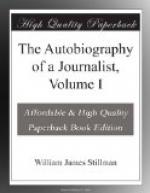MY ROMAN CONSULATE
The convenient road from London to Rome, when I went there as consul, was via Paris to Marseilles, and thence by sea to Civita Vecchia. It was December when I left London, and the journey from Paris to Marseilles, in a third-class carriage, took twenty-six hours. The Mont Cenis tunnel had not been opened yet, and the voyage by diligence was tedious, costly, and at that season uncomfortable on account of the cold. I arrived at Rome shortly before Christmas, when the city was astir with the preparations for the great ceremonies which were then the principal attraction for foreigners there, but the number of visitors was very small compared with that which now gathers to their diminished religious and spectacular interest. The foreign quarter was limited to that immediately about the Piazza di Spagna, and only the artist folk lived in the remoter quarters, where they found cheap and commodious apartments in the palaces of fallen nobility, glad to let their upper stories; and there were few or no new houses.
Rome was given up to art and religion; it was still decaying, picturesque, pathetic, and majestic. Where now we find the prosperous and hideous new quarters,—the Via Nazionale, and the expanse of structures to the east of it, the region between the Coliseum and the Lateran, the 20 Settembre, Via Veneto, and the vicinity where were the Ludovisi gardens, and now are long streets of ugly houses, with the entirely new quarter of the Prati, were then expanses of vineyards and gardens, and we used to cross the Tiber by a ferry to visit the farm of Cincinnatus, now buried under twenty feet of rubbish, on which are built the palaces of the Prati, huge, ugly barracks; and even the Campagna has lost much of its desolate beauty. Down the Tiber, where the ghastly embankment walls in the yellow stream, there was then a picturesque riverbank, with a delightful foreground in every rood of it. Where now is the Piazza delle Terme and the great railway station, we used to go to get studies of the ruins of the baths of Diocletian, one of the most picturesque objects of the region.
Political or social life there was none, and the foreign element, whether the regular or the transitory, was divided by its nationalities, and cut off absolutely from the Roman. Only the English and American mingled to any extent, the foreign Catholics finding their way, with such Protestants as gave hope of conversion, into the clerical world, which, from all that I could see of it, offered little attraction to the fugitive visitors. Wide-eyed, hurried Americans came, saw, and bought a picture, and went away again; English sightseers came for Christmas or Easter, and bought a few old masters; but the mass of those who stayed for long were invalids, who settled down and tried to keep as much in the sun as possible, for the universal belief then was that to live out of the sunshine was to contract mortal malaria. It was the most unreal world I have ever lived in, whether we use the word unreal in the sense of shadowy or poetical.




